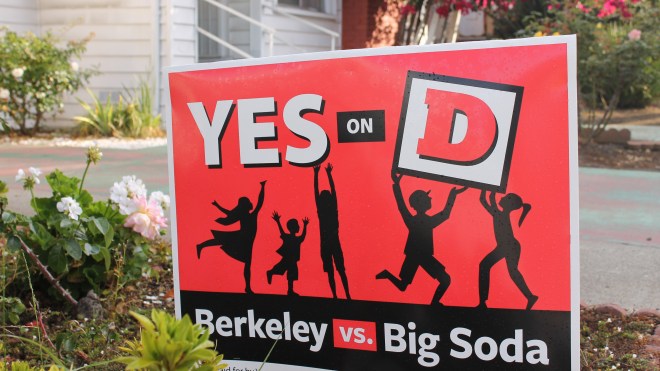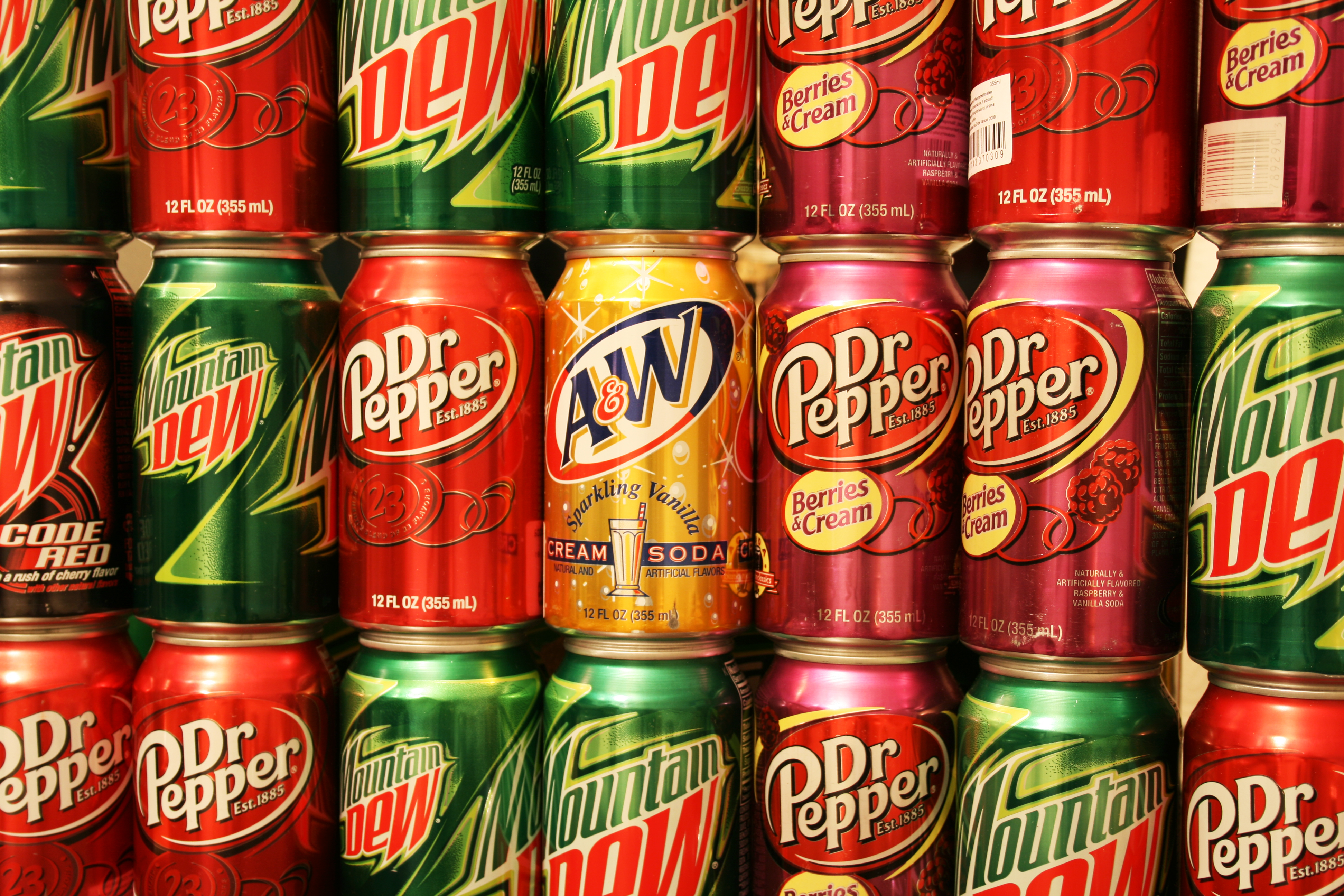Here in Berkeley, where I live, the signs are everywhere. Yard signs, that is, for and against a new soda tax.
According to a scientific survey that consisted of me haphazardly noticing the signs as I walk around, there’s a lot more of the white-on-red “yes” signs than the red-on-white “no” signs. Polls suggest the tax has a slimmer lead — a clear majority currently supports it, while 28 to 38 percent of voters oppose.

But it’s clear that there’s a lot more money powering the forces opposing the measure. I see canvassers in white “no on D” t-shirts carrying clipboards from door to door. The anti-soda-tax campaign is also running push polls. I haven’t gotten one of these calls, but another Berkeley resident, former Secretary of Labor Robert Reich, did. Here’s how he described it on his blog:
I was phoned the other night in middle of dinner by an earnest young man named Spencer, who said he was doing a survey.
Rather than hang up I agreed to answer his questions. He asked me if I knew a soda tax would be on the ballot in Berkeley in November. When I said yes, he then asked whether I trusted the Berkeley city government to spend the revenues wisely.
At that moment I recognized a classic “push poll,” which is part of a paid political campaign.
So I asked Spencer a couple of questions of my own. Who was financing his survey? “Americans for Food and Beverage Choice,” he answered. Who was financing this group? “The American Beverage Association,” he said.
Spencer was so eager to get off the phone I didn’t get to ask him my third question: Who’s financing the American Beverage Association? It didn’t matter. I knew the answer: PepsiCo and Coca Cola.
Across the bay, San Francisco has another proposal to tax beverages on the ballot. That one needs a two-thirds majority, and probably won’t pass. Politico’s Helena Bottemiller Evich, noting the wave of failures among cities attempting beverage taxes, called these dual contests the “Soda fight’s last stand.”
“If a soda tax can’t pass in the most progressive city in America, it can’t pass anywhere. Big Soda knows that, which is why it’s determined to kill it here,” Reich wrote. It’s as if beverage corporations had beaten down most pockets of rebellion, but in this one liberal bastion, a plucky group of insurgents is making one last-ditch attempt … fire up the stirring soundtrack.
This is also an environmental issue, in a roundabout way. Obesity overwhelmingly afflicts the poor; it’s not the opposite of hunger — it’s just the other side of the same coin. And if we’re going to control population growth, we’ll need more equitable access to food.
The struggle over caloric-beverage taxes has the classic hallmarks of polarization: irreconcilable talking points, two separate sets of science, and few substantive voices to bridge the gap. The progressive public health types say taxing beverages will reduce soda consumption and help curb the obesity epidemic; the conservative free-market types say taxing soda does nothing to reduce obesity and just provides an excuse for the government to grab more money.
I think I’ve figured out how to reconcile all this conflicting information. There’s a good body of evidence on soda taxes, and each campaign cites it … selectively.
There’s good evidence that increasing the price of soda makes people buy less of it, even if you are only raising the price by 10 percent. (Berkeley’s proposal would boost prices about 20 percent — San Francisco’s as much as 40 percent.) This makes sense — why else would soda companies oppose it?
But then, on the other side, you can look at West Virginia and Arkansas, which have had soda taxes for a long time. You hardly see obesity vanishing there. The anti-tax side cites studies suggesting that people just consume more beer, or other high-calorie foods, and you just end up with this regressive tax on the poor.
The retort: Lots of states have soda taxes, but they are hidden and small — much smaller than the ones on the ballot in the Bay Area. One of those studies the anti-tax side cites also says: “A tax would likely need to be much greater in order to generate a substantial decrease.” Jack taxes up, and you start changing things — check out the evidence! Oh no you don’t, says the other side, we have evidence that doesn’t work.
Confused? Here’s what I think is going on: I’m convinced that a 20 percent soda tax will reduce soda purchases. Taxes tend to discourage whatever is taxed. This is why economists tend to hate payroll and corporate income taxes (see this recent example) but love sin taxes. Tax the stuff you want less of — cigarettes, carbon, driving — and it disappears, while magically filling the government coffers. The biggest gripe about sin taxes is that they aren’t a reliable form of revenue, because they so effectively drive themselves out of existence.
But soda isn’t the main problem here. The problem is obesity. But since there’s no sensible or reasonable way to tax that, instead we try to tax the things that contribute to it. Diet-related disease are crucially different from tobacco in that they have a lot of different causes. And the notion that people might substitute other calories if they stop buying soda really does make sense. If you are used to having a soda every day at lunch, you’re going to crave something to replace that treat.
So it’s not surprising that previous soda taxes have failed to end the obesity epidemic. A better solution might be to target the corporations rather than the consumers. If we taxed raw sugar, high fructose corn syrup, and all the other caloric sweeteners, food companies would start looking for ways to use less. This might be a better solution, but that doesn’t mean these city soda taxes are bad.
Even though soda is not the sole cause of obesity, it is a major factor. It’s a huge source of totally empty calories. If people switch to pizza or chocolate milk, that would be an improvement. And say the soda tax fails to do anything about health, what then? Well, then the city has some money to address the problem. The anti-tax campaign warns that the money will go into Berkeley’s general fund, but so what? That just gives the city the freedom to work creatively. Nutrition counseling, food assistance, poverty alleviation, parks and recreation, and any number of other programs could help.
In Arkansas, the money helps pay the state’s healthcare bills. The state has raised $630 million since 2001. And the tax is popular enough, even in that conservative state, to have survived multiple repeal attempts.
This tax isn’t going to stop obesity in its tracks. Instead it’s a step in the right direction. I’ll vote for it.



